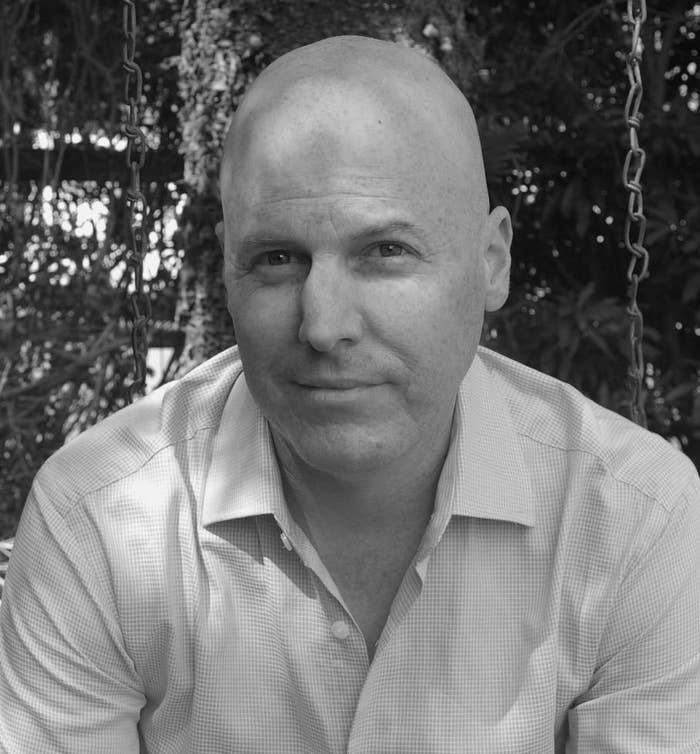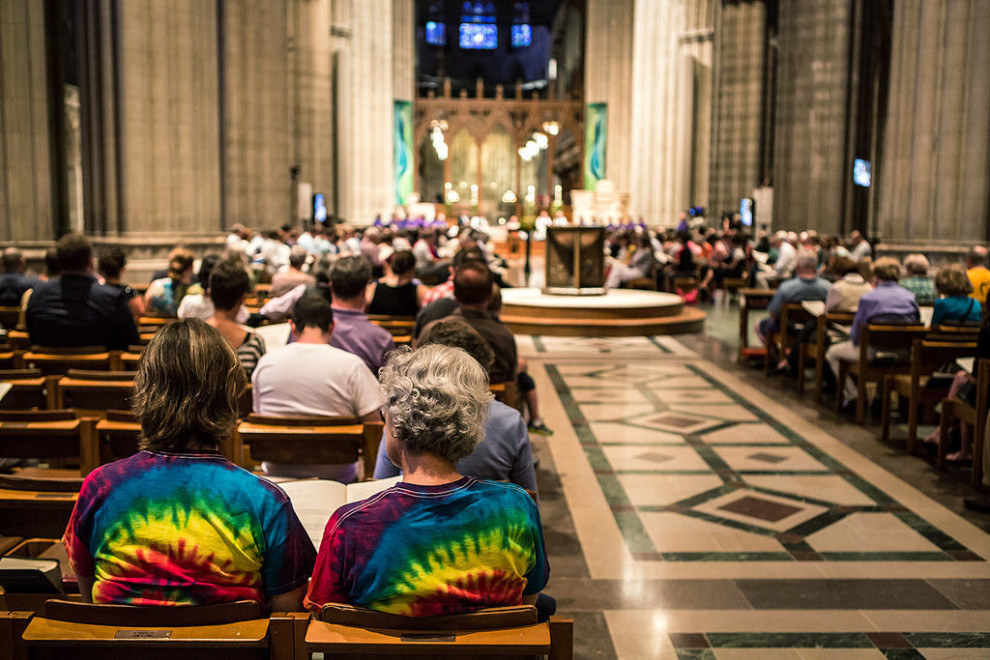Geoff Ahern regularly comes across people at their very lowest.

As a clinician within a specialised Victoria police unit for mental health emergencies, Ahern, 46, deals with people who are suicidal, acting erratically, or in a state of crisis.
But 10 years ago, he was in a mental health crisis of his own.
Years of gay conversion therapy, which began when Ahern was just 15, had left him in a state of inescapable self-loathing.
Convinced he could be straight if he tried – and prayed – hard enough, Ahern underwent numerous counselling sessions at a Sydney Christian Life Centre, part of a group of churches associated with today's Pentecostal Australian Christian Churches.
In his early twenties, he married a woman, encouraged by the idea that if he settled down and got married, everything would be OK.
But it wasn't, and Ahern crumbled into a "state of despair".
He would get home from work and cry himself to sleep in a similar mental state to the people he had just spent hours helping.
"I became suicidal myself. I thought, this has got to stop. I can’t do this any more," Ahern told BuzzFeed News.
"If you can work so hard and ask God to change you and fix you and he doesn’t, there are two outcomes of that: one, he’s a cold-hearted bastard; or two, there’s actually nothing wrong with me."
On Wednesday, a powerful new watchdog to crack down on dodgy health practitioners – including providers of gay conversion therapy – will come into force in Victoria.
The current health services commissioner will be replaced by a new health complaints commissioner (HCC) who will have greater powers to investigate unregistered health practitioners and can receive a complaint from anyone, not just the person treated.
In February 2016, Victorian health minister Jill Hennessy told parliament the bill would mean the HCC can "investigate and crack down on anyone making dangerous and unproven claims that they can 'convert' gay people".
But the increasingly underground nature of gay conversion therapy in Australia – also known as "ex-gay therapy" and "reparative therapy" – has led advocates to question whether any legislation could properly wipe out the practice.
Timothy Jones, a researcher at La Trobe University in the final stages of a study into conversion therapy, told BuzzFeed News he was surprised by how common the practice is in Australia.
"It is much more widespread than we thought it was, and much more pervasive than we would have expected," he said.
While most formal conversion therapy groups – such as Exodus or Living Waters – have closed, Jones and co-researcher Liam Leonard found the practice of gay conversion therapy in Australia has continued, mostly in Protestant churches.
The study found a range of therapies, including pastoral counselling, sessions with professional psychologists, online counselling, and group activities. One study participant received electroshock therapy.
"What we actually found was that a lot of groups have reorganised themselves, renamed themselves, so looking at them from the outside you wouldn’t know they are doing conversion therapy," Jones said.
"People growing up in the church, at some stage realise they are attracted to people of the same sex, or realise they identify with the gender they were not assigned and want to transition. They will seek advice from a pastor, and the pastor will know someone to refer them to."

Counsellor Matt Glover, who specialises in treating LGBTI people from church backgrounds, said the underground nature of ex-gay ideology is particularly concerning when young people are involved.
"[A parent] might find out their son or daughter is gay, tell the pastor, sign them up for some counselling sessions, and the ex-gay philosophy is fed to the client," he said. "It’s really hard to tell – it’s a confidential space, no one can go in and hear what is being said."
Glover said Victoria's expanded powers to tackle conversion therapy will "knock off some of the rougher edges", but that the insidious nature of ex-gay therapy is tougher to tackle.
"It will help, but I don’t know that there’s any way to get into the core of religious communities that place their belief in ideas that are anti-gay," he said.
Victoria's crackdown on conversion therapy is unprecedented in Australia, and comes after calls in recent years to make the practice illegal.
Conversion therapy is opposed by the Australian Psychological Association, the Australian Medical Association, and the United Nations, among numerous other professional health and human rights bodies. It is deemed ineffective, unethical, and actively harmful.
A Columbia Law School project collating conversion therapy research found that among people who had undergone such treatment, there was a prevalence of depression, anxiety, social isolation, decreased capacity for intimacy, and suicidal thoughts and behaviours.
“There is powerful evidence that trying to change a person’s sexual orientation can be extremely harmful,” the researchers concluded.

Ahern is well-acquainted with the problems that can manifest from stoking this particular inner shame – even if there's no formal conversion therapy involved.
"I assessed a young man a couple of years ago who comes from a conservative, typically Aussie, blue-collar family," he told BuzzFeed News.
"When we got to the bottom of his alcoholism and other issues, it was because he was gay and hadn’t told anyone. He said to me, ‘If I told my dad, he would beat the shit out of me.'"
About 10 years ago, Ahern decided things had to change.
He started to see a psychologist outside of the church to talk about who he was and what he had experienced.
"That was incredibly helpful to talk to somebody who was outside of the church and outside of my friends and family," he said. "That started the journey of thinking 'There’s nothing wrong with me'."
Three years ago, he moved to Melbourne. Two years ago, he and his wife separated, after a relationship spanning 25 years and five kids.
But Ahern and his ex-wife remain close. On the weekend, they took their two youngest children to see Cirque Du Soleil.
"We’d been talking about it for a couple of years," Ahern said. "It wasn’t just all of a sudden. Progressively I told her more and more of my story and we worked out how we were going to move forward.
"It wasn’t acrimonious at all. We had and still have a wonderful relationship."
